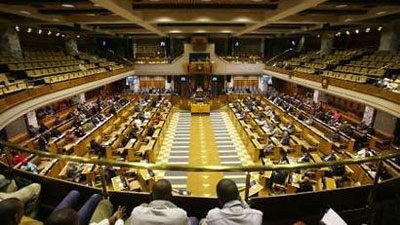
THE hullabaloo created by the Mining Charter in the last month has distracted attention from the equally important issue of the Minerals & Petroleum Resources Development Amendment bill, the last known location of which was the halls of Parliament’s upper house, the National Council of Provinces (NCOP).
This is the legislation which says minerals are the patrimony of South African citizens and which requires mining companies to, therefore, rent mining properties from the State. In order to so do, mining companies must meet the conditions of transformation, environmental protection, as well as labour and social plans. It is the bedrock on which the Mining Charter relies and helps align the interests of international mining firms with big bucks to the national interest.
So it’s pretty big news that attorneys who specialise in mining law have mixed views on the kinds of amendments that will be made to the MPRDA. Government has said the promulgation of the amendment bill – which was sent back by former president Jacob Zuma in January 2015 – would be made a priority.
Speaking at a press conference in March, mines minister Gwede Mantashe commented that: “The MPRD Amendment Bill is currently before Parliament. We are considering appropriate ways of ensuring urgent progress at that level”. So the bill looks like it will press ahead with the amendments. But what amendments exactly?
Zuma’s reason for refusing to sign the MPRD Amendment bill into law was that it failed certain constitutional tests; one was there had not been sufficient consultation, especially in the NCOP. No sooner had the bill been returned to Parliament than rumours swirled around the intentions of Trade and Industry minister, Rob Davies, wanted to introduce new elements to the legislation – or so it was suggested. It was during this three year period of limbo that former mines minister, Mosebenzi Zwane, commandeered the process by shopping the bill around various interested parties, allegedly for fresh input.
Even before Zwane’s alleged fiddling with the bill, there were questions as to whether it would cut the mustard. Of particular concern was an amendment that mining companies intending to export minerals from South Africa would first have to apply for a licence from the mines minister who might apply certain conditions. These conditions might be quotas on export volumes, or even a preferential domestic supply quota if the mineral was deemed ‘strategic’. Iron ore and coal were generally the minerals supposed to fall under this clause.
So confusion reigns.
“The Bill is as problematic as ever with the same troublesome provisions over designated minerals and what is clearly a non-WTO (World Trade Organisation) compliant export licensing system for such minerals,” said Peter Leon, a partner at Herbert Smith Freehills.
Attorneys don’t agree if any new provisions were actually added, but there is enough confusion to cause concern. “I doubt it will be changed,” said Jonathan Veeran, an attorney for Webber Wentzel. “It was not radically changed under Zwane,” he said.
Leon is not so sure, however. “If the bill is passed as promised, it is likely to face a constitutional challenge as the DMR [Department of Mineral Resources] should never have introduced additional amendments to it following Zuma’s referral back in January 2015,” he said. Such changes were not permitted under the Constitution.
Dimitri Cavvadis, an attorney for Fasken, a Canadian firm operating in Johannesburg, said that since the Bill had been submitted to the NCOP there was no possibility any mooted changes could be made as this would be unconstitutional. But changes have been attempted. And it’s interesting to know what they are even if – in Cavvadis’ view – they have little chance of success.
“During the couse of 2017, the DMR introduced additional amendments to the Bill and some of these amendments included provisions that mining permits will only be granted to majority black-owned South African companies,” he said. A breach of this would ” … therefore permit the minister to suspend or cancel rights”.
As for how the eventual promulgation of legislation identifying coal (and iron ore) as a designated mineral, all eyes would fall on the regulations accompanying the Bill, said Cavvadis. “In our view the authority of the minister to declare certain minerals as ‘designated minerals’ … must be clearly defined and set out in either the Bill or in the regulations,” he said.
Asked by Miningmx for its interpretation of the MPRD Amendment Bill’s potential effect on the country’s coal sector, the Chamber of Mines was circumspect. “The Chamber hasn’t had an opportunity to engage the new DMR leadership on the MPRDA amendments and how the former president’s referrals to Parliament are to be dealt with,” said senior executive for public affairs and transformation, Tebello Chabane.










